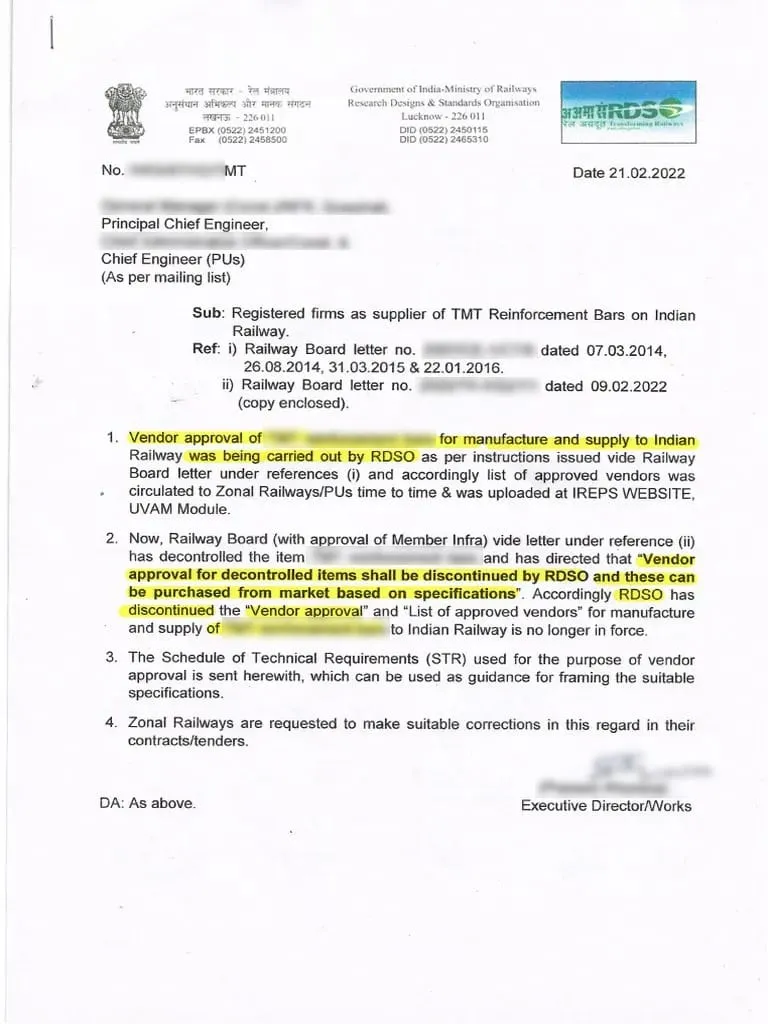Updated on May 06, 2025 02:36:56 PM
RDSO registration for Geotechnical Engineering is essential for companies involved in soil testing, foundation design, and ground improvement for railway projects. It helps engineers, consultants, and contractors ensure railway infrastructure is reliable and durable. The Research Design and Standards Organization (RDSO) works under the Ministry of Railways. It makes sure that geotechnical engineering is safe, effective, and high quality.
This registration ensures that railway projects are built on solid and well-tested ground. It boosts the strength of tracks, bridges, and stations. This happens through careful soil analysis and proper foundation design. RDSO guidelines help ensure the use of quality materials and advanced engineering practices. This reduces risks like weak ground, track damage, and structural issues. So, trains travel smoothly without problems.
The registration process involves multiple steps. It begins with an application, followed by submitting detailed technical documents on geotechnical investigations and testing procedures. RDSO examines the methods, equipment, and safety standards. They check that all the requirements are met before approving them.
Getting RDSO registration for Geotechnical Engineering helps companies grow in the railway industry. It lets them work on railway projects and helps make railways safer and more reliable. Consultants and contractors who have RDSO approval can gain trust with Indian Railways. This can open up more opportunities for major railway projects.
RDSO Certificate [Sample]

The RDSO Certificate is an official approval granted by the Research Designs and Standards Organization (RDSO), which operates under the Ministry of Railways. Headquartered in Lucknow, RDSO ensures that railway products, equipment, and services meet strict safety and quality standards. This certificate lets businesses get approval to work with Indian Railways and apply for railway contracts. It shows that a company meets technical standards, helping make railway operations safer, more reliable, and efficient. Getting an RDSO Certificate helps a company gain trust and find more business opportunities in the railway industry.

Entities supplying goods to Indian Railways can benefit significantly from RDSO vendor Registration in the following ways:

Once registered, vendors can log into their profiles via the RDSO vendor portal. This platform enables them to track their application status, update company details, and access the official list of approved vendors published by the Research Designs and Standards Organization.

To obtain an RDSO certificate online for Geotechnical Engineering, make sure all required documents are in order and perform a regular RDSO registration check to monitor progress. Here’s a step-by-step process to obtain an RDSO certificate for Geotechnical Engineering:

The documents required for Research Designs and Standards Organization (RDSO) Registration Online for Geotechnical Engineering may vary based on the product category and the type of vendor registration. Below is a comprehensive list of documents typically required:

Here are the key compliance requirements for Research Designs and Standards Organization (RDSO) Registration for Geotechnical Engineering in India:

The Govt fee for RDSO Registration is as follows:
| For items having 5 or more registered vendors | |
|---|---|
| For Indian firms (Micro & Small) | ₹1.5 lakh to ₹10,000 |
| For firms other than micro & small | ₹2.5 lakh to ₹15,000 |
| For foreign firms | $12,000 to $500 |
Note: The aforementioned Fees is exclusive of GST.

RDSO registration ensures compliance with railway standards, requiring periodic renewal to maintain vendor approval and continue supplying to Indian Railways.
Failure to renew may lead to removal from the RDSO vendor list.

Conclusion
RDSO registration for Geotechnical Engineering is essential for businesses involved in railway projects like soil analysis and ground improvement. It ensures compliance with Indian Railways' safety and quality standards, allowing vendors to participate in railway tenders. The process includes document submission, verification, and testing before approval. Approved vendors gain credibility and better business opportunities. The registration is valid for two years and must be renewed to continue supplying to Indian Railways. Following RDSO guidelines helps make railway projects strong and safe. Getting RDSO registration is simple and helps businesses to grow with Indian Railways.

At Professional Utilities, we leverage our industry knowledge and expertise to help businesses navigate complex regulations, minimize risks, and optimize operations for maximum efficiency and profitability.






Frequently Asked Questions (FAQs)
RDSO registration certifies that companies meet Indian Railways' quality standards for soil testing, foundation design, and ground improvement in railway projects.
Engineers, consultants, and contractors involved in railway infrastructure, including soil analysis and foundation design, require RDSO registration to work with Indian Railways.
RDSO registration is typically valid for two years and requires renewal to maintain vendor approval for railway projects.
Required documents include company registration, ISO certificate, financial records, quality control details, manufacturing facilities, supplier details, and testing equipment information.
It enables participation in railway tenders, boosts credibility, ensures compliance with safety standards, and provides better opportunities in railway infrastructure projects.
The process includes application submission, document verification, product testing (if required), compliance checks, and final approval from RDSO authorities.
Yes, foreign companies can apply, but they must meet RDSO’s technical and compliance requirements and undergo strict evaluation before approval.
Failure to renew may lead to removal from the RDSO vendor list, restricting the company from participating in railway tenders and projects.
Speak Directly to our Expert Today

Reliable

Affordable

Assured
Industries Served by
Professional Utilities
Apparels
Footwear
Furniture
Gems and Jewellery
Tourism & Hospitality
Consumer Electronics
Chemicals
Telecom
Oils & Gas
Hotel
Railways
Liquor
Health & Medical
Food Processing
Dangerous/ Haz. Goods
Tea & Coffee
Capital Goods
Recycling
Rubber
NGOs
Silk
Handloom
IT & BPM
Steel
Automobile
Tobacco
Constructions